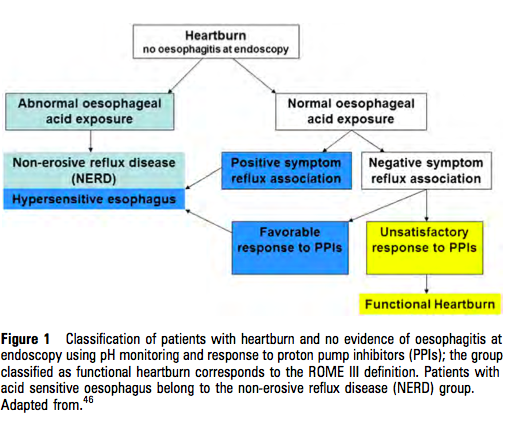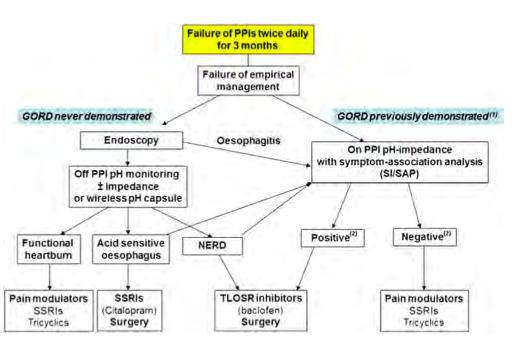
Diagnosis and management of patients with reflux symptoms refractory to proton pump inhibitors
Daniel Sifrim, Frank Zerbib
Correspondence to Professor Dr Daniel Sifrim, The Wingate Institute of Neurogastroenterology, 26 Ashfield Street, London E1 2AJ, UK; d.sifrim@qmul.ac.uk
[EXCERPTS]
Approximately a third of patients with suspected gastro-oesophageal reflux disease are resistant or partial responders to proton pump inhibitors (PPIs). Many of these patients do not have gastro-oesophageal reflux disease, but suffer from functional heartburn or dyspepsia. The potential mechanisms underlying failure of PPI treatment in patients with reflux-related symptoms include persistence of isolated or mixed acid, weakly acidic, bile or gas reflux, impaired oesophageal mucosal integrity, chemical or mechanical hypersensitivity to refluxates and psychological comorbidity. After thorough clinical evaluation and failure of empirical changes in PPI dose regime, diagnostic investigations include endoscopy and reflux monitoring with pH or pH-impedance monitoring. If symptoms are clearly related to persistent reflux, baclofen, antireflux surgery or pain modulators can be considered. If not, pain modulators are the only currently available therapy.

Figure 2 Algorithm for management of patients with refractory reflux symptoms.
[NERD, non-erosive reflux disease. SI, symptom index. SAP, symptom association probability.] TLOSR, transient lower oesophageal sphincter relaxation. SSRIs, selective serotonin reuptake inhibitors.
Management of patients with refractory reflux symptoms
Empirical management
Patients presenting with refractory reflux symptoms can be initially managed empirically. If atypical reflux symptoms or severe dyspeptic symptoms are diagnosed, a specific work up is mandatory. If typical reflux symptoms persist, that is, heartburn and regurgitation, compliance and dosing time should be checked, since taking PPIs before meals provides a better gastric acid secretion control. Though not supported by strong clinical data, switching to another PPI brand may be an option before doubling the dose. Twice daily PPIs (single dose taken before breakfast and before dinner) is not an approved dose by health authorities but could achieve adequate symptom control after 6–8 weeks of therapy in approximately 20%–30% of patients with inadequate symptom control on once daily PPI. If clinical remission is achieved, titration can be proposed after 2–3 months of double dose therapy. In case of failure, adding alginates or H2RAs at bedtime may be tested, but one has to keep in mind that H2RAs should better be taken on demand or intermittently to avoid tolerance.
Therapeutic options
Lifestyle modifications
Diet and lifestyle modifications like weight loss, head of bed elevation and avoiding late-night meals are effective interventions for GORD. More recently, actively training the diaphragm by breathing exercise has been shown to improve GORD as assessed by pH-metry, quality of life scores and PPI usage. However, whether these interventions may be useful in patients with refractory reflux symptoms remains to be demonstrated. The role of diet is frequently advocated by patients with reflux symptoms who failed PPI therapy but there is no clear evidence for a benefit of excluding specific foods (eg, acidic or spicy foods). As fat can increase oesophageal sensitivity to acid, heavy meals are usually avoided spontaneously by the patients themselves.
Antisecretory drugs
Switching to another PPI is frequently tested by physicians, and though no strong scientific data (neither pharmacological nor clinical) support this strategy, it has proven to be effective in routine clinical practice. Doubling the dose of PPI is very common though, again, virtually no data support this strategy.
Add-on therapies with PPIs
For the time being, there are no data supporting the use of prokinetics as add-on therapy in patients with refractory reflux symptoms while adding alginates (spontaneously done by many patients) to omeprazole 20 mg has been recently shown to improve symptom control.
Nocturnal gastric acid breakthrough occurs in more than 75% of patients taking PPIs twice daily and adding histamine 2 receptor antagonists (H2RAs) at bedtime has been shown to improve nocturnal gastric acid control in GORD patients. Based on these results and personal experience, several experts, mainly from the USA, advocate the intermittent or on-demand use of H2RAs at bedtime.
For the time being, the only compound available for human use that can decrease TLOSRs occurrence is baclofen, a GABABagonist used for many years for the treatment of spasticity. To summarise, baclofen is currently the only available compound that can be helpful to reduce the occurrence of TLOSRs and control refractory reflux symptoms as add-on therapy with PPIs, but its use is limited by a poor tolerability.
Pain modulators
Most patients with persisting symptoms despite PPI therapy have a normal oesophageal exposure to acid and bolus and probably have oesophageal hypersensitivity. In the context of visceral hypersensitivity, the use of pain modulators may be attractive since tricyclic antidepressants, trazodone and selective serotonin reuptake inhibitors have all been shown to improve oesophageal pain in patients with non-cardiac chest pain. In a randomised placebo-controlled study, citalopram 20 mg once daily for 6 months has been shown to be effective in patients with acid hypersensitive oesophagus and refractory GOR symptoms.
Endoscopic therapy
To our best knowledge, there are only two antireflux endoscopic devices that are still currently available for human use, that is, the Stretta procedure and the EsophyX transoral incisionless fundoplication.
Antireflux surgery
There is no doubt that laparoscopic fundoplication is a very effective therapy to control acid and non-acid GOR. To summarise, surgery can be a valuable option in patients with typical reflux symptoms with inadequate response to PPIs, provided abnormal oesophageal acid exposure and/or positive symptom association analysis can be demonstrated ‘off’ PPI therapy.
[Link to free BMJ article PDF for full text, algorithms, and references]
Copyright © 2012 BMJ Publishing Group Ltd & British Society of Gastroenterology.





 留言列表
留言列表
 線上藥物查詢
線上藥物查詢 